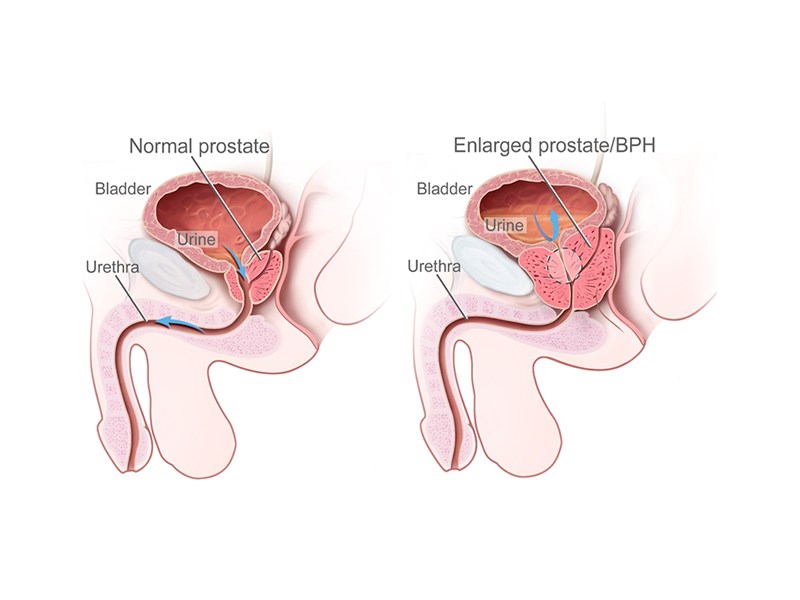
Benign Prostatic Hyperplasia (BPH)
What is benign prostatic hyperplasia?
Benign prostatic hyperplasia (also called BPH) is a condition that affects the prostate gland in men. The prostate is a gland found between the bladder (where urine is stored) and the urethra (the tube urine passes through). As men age, the prostate gland slowly grows bigger (or enlarges). As the prostate gets bigger, it may press on the urethra and cause the flow of urine to be slower and less forceful. "Benign" means the enlargement isn't caused by cancer or infection. "Hyperplasia" means enlargement.
What are the symptoms of BPH?
Most symptoms of BPH start gradually. One symptom is the need to get up more often at night to urinate. Another symptom is the need to empty the bladder often during the day. Other symptoms include difficulty in starting the urine flow and dribbling after urination ends. The size and strength of the urine stream may decrease.
These symptoms can be caused by other things besides BPH. They may be signs of more serious diseases, such as a bladder infection or bladder cancer. Tell your doctor if you have any of these symptoms, so he or she can decide which tests to use to find the possible cause.
How will my doctor know if I have BPH?
After your doctor takes a complete history of your symptoms, a rectal exam is the next step. In a rectal exam, your doctor checks your prostate by putting a gloved, lubricated finger into your rectum to feel the back of your prostate gland. This exam allows your doctor to feel the size of the prostate gland.
To make sure that your prostate problem is benign, your doctor may need to look at a sample of your urine for signs of infection. Your doctor may also do a blood test. An ultrasound exam or a biopsy of the prostate may help your doctor make the diagnosis.
How will my doctor treat my BPH?
Once your doctor is sure that your symptoms are caused by benign growth of the prostate gland, treatment can be recommended. However, your doctor may suggest that you wait to see if your symptoms get better. Sometimes mild symptoms get better on their own. If your symptoms get worse, your doctor may suggest another treatment option.
One option is a minimally invasive treatment. This means it does not involve surgery. Most of these treatments use heat to destroy prostate tissue that is pressing on the urethra. Minimally invasive treatments can usually be done by your doctor in his or her office rather than at a hospital.
Surgery is considered the most effective treatment and is used in men with strong symptoms that persist after other treatments are tried. This is also the best way to diagnose and cure early cancer of the prostate. Surgery is usually done through the urethra, leaving no scars. Surgery does have risks, such as bleeding, infection or impotence. These risks are generally small.
Are there any drugs I can take?
Drug treatments are available. Finasteride and dutasteride block a natural hormone that makes the prostate enlarge, but it does not help all patients. The side effects of finasteride are rare and mild, but they usually have to do with sexual function. They go away when the medicine is stopped. The prostate may enlarge again when the medicine is stopped, so your doctor may suggest another treatment.
Another kind of medicine, called alpha-blockers, also can help the symptoms of BPH. Alpha-blockers have been used for a long time to treat high blood pressure, but they can also help the symptoms of BPH, even in men with normal blood pressure. Some of these drugs are terazosin, doxazosin, tamsulosin and alfuzosin. These medicines may not work in all men. The side effects of alpha-blockers include dizziness, fatigue and lightheadedness. The side effects go away if you stop taking the medicine.